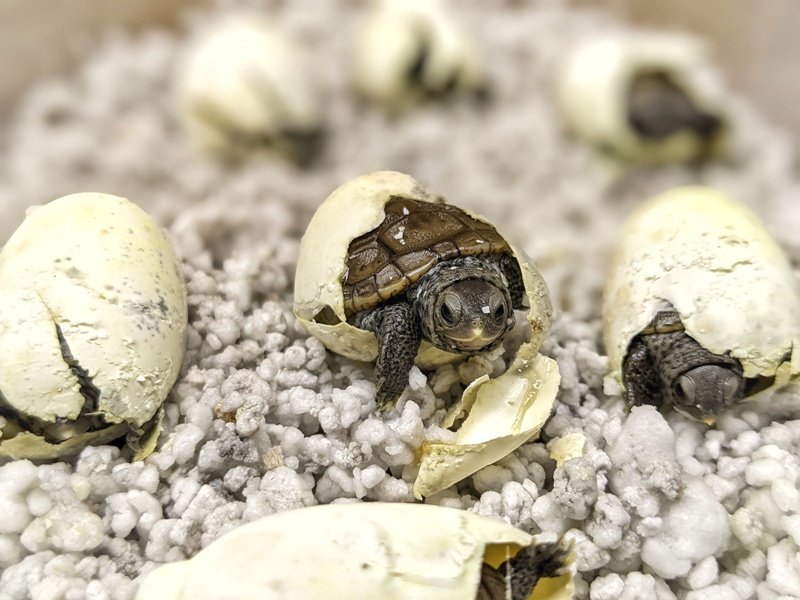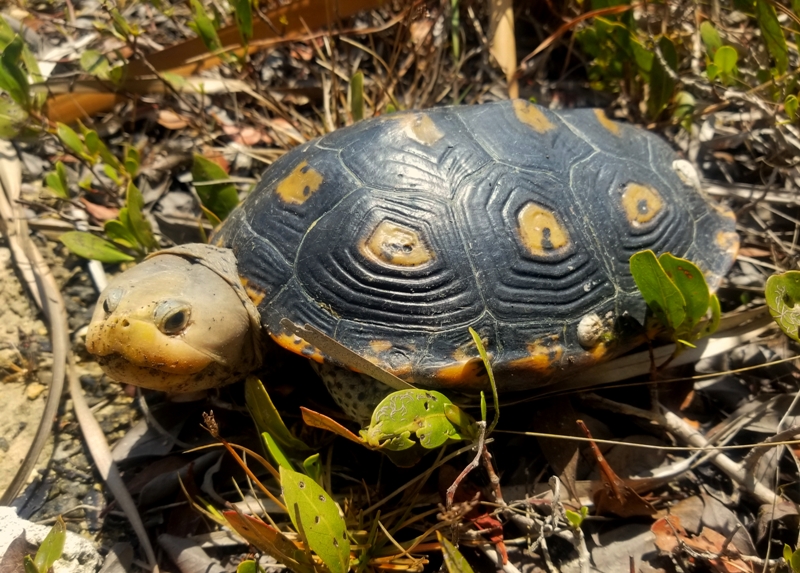Captive Breeding of Diamondback Terrapins to be discussed at FWC Meeting in Panama City Today Nov 30.
Proposal for captive breeding supported by conservation groups and scientists

Above: Captive bred Diamondback Terrapins hatching (Photo by Ed Komara Jr.)
The Diamondback terrapin is a unique species of turtle that inhabits Florida’s salt marshes and mangrove swamps. Due to their beauty and personable nature, people all over the world like to keep terrapins as pets. The high demand for terrapins in Asia, especially China, has driven illegal wild collection to dangerous and potentially unsustainable levels. USARK FL (United States Association of Reptile Keepers Florida) has proposed a program to FWC (Florida Fish and Wildlife Conservation Commission) to allow the legal captive breeding of terrapins in Florida to supply the trade with captive bred animals, which it believes would discourage illegal collection of wild terrapins. That proposal may be seen here:
Founder of the Turtle and Tortoise Preservation Group (TTPG), Russ Gurley, has offered positive comments on captive breeding to FWC. “Captive breeding of threatened species not only alleviates the need for people to remove turtles from nature, but it assures that future hobbyists have access to healthy, stress-free, parasite-free animals,” said Gurley. He added, “Captive breeding helps create assurance colonies across the country in case a need arises to repopulate areas that have been wiped out by manmade or natural disasters. We strongly believe that legal captive breeding of Diamondback Terrapins in Florida could supply the reptile trade with these healthy, captive-bred offspring and remove great pressure placed on wild populations.”
Colette Adams, Deputy Director of Gladys Porter Zoo, and a noted expert on the breeding and conservation of turtles, has supported USARK FL’s proposal. Adams said, “As a member of the IUCN Crocodilian Specialists Group, I can say as a matter of fact, that there are a number of species that have been saved from extinction by sustained utilization, by breeding them in captivity and preventing their capture from the wild.”
Ashton Biodiversity Research and Preservation Institute, an organization that was instrumental in convincing FWC to end legal entombment of gopher tortoises over a decade ago, now supports the implementation of a captive breeding program for terrapins. “We believe that allowing turtle breeders in Florida to breed this species in captivity would provide a source of animals for commerce. The availability of healthy, captive bred terrapins would provide an alternative to terrapins illegally collected from the wild. This in turn will significantly help the Diamondback terrapins and the ecosystems they inhabit. A captive breeding population of Diamondback terrapins could also serve as a source to help restore wild populations with genetic diversity if the terrapin’s population continues to decline in the wild,” said Pat Ashton, Director of the Institute.
Chase Pirtle, Manager of Ashton Biological Preserve, stated that “due to the current threats terrapins are facing, as well as the challenges they will be confronted with in the foreseen future, a captive breeding program for the Diamondback terrapin is essential for the future of this species.”
Respected herpetologists Dirk Stevenson (Altamaha Environmental Consulting, The Orianne Society), and Dr. David Rostral (Georgia Southwestern University) have also offered their endorsements of USARK FL’s captive breeding proposal.
The remarkable recovery of the American alligator through farming efforts has proven that captive breeding of reptiles can be effective in reducing poaching by supplying the market with captive-produced products. Brendan J. Moyle of Massey University documents this occurrence in Conservation that’s more than skin-deep: Alligator farming here:https://www.researchgate.net/publication/257538487_Conservation_that's_more_than_skin-deep_Alligator_farming National Geographic reported that after the Colombian government permitted a captive breeding program of Poison dart frogs to supply the international pet trade, the price of the most highly-demanded species fell from $150 to $35, thus making it economically impractical for illegal traffickers to risk collecting and smuggling them. https://www.nationalgeographic.com/animals/article/poison-dart-frogs-breeding-colombia-wildlife The BBC recently reported that scientists at the University of Durham in the UK have advocated for captive breeding and commercialization as a strategy to recover songbird populations which have been impacted by over collection for the Asian pet trade. https://www.bbc.com/news/science-environment-62918776#amp_tf=From%20%251%24s&aoh=16633863476153&csi=0&referrer=https%3A%2F%2Fwww.google.com&share=https%3A%2F%2Fwww.bbc.com%2Fnews%2Fscience-environment-62918776 Dr. Whit Gibbons of University of Georgia and founder of Southeast Partners in Amphibian and Reptile Conservation (SE PARC) supports the captive breeding proposal for Diamondback terrapins. “The availability of captive-bred animals removes pressure on wild populations,” said Gibbons. He continues, “USFWS (United States Fish and Wildlife Service) has given a positive statement about alligator snappers being raised in captivity.” Gibbons refers to a recent USFWS document proposing the Federal listing of the Alligator Snapping turtle, which states: “The service recognizes that turtle farming can alleviate harvest of wild stock and provides a means to serve international markets without affecting wild populations in the future.”
Gibbons added, “The examples of other species of animals where captive breeding has been implemented as a solution to reduce pressure on wild populations are encouraging. Diamondback terrapins mature quickly and breed easily in captivity. They produce many offspring, ensuring that breeders would be able to impact markets fairly quickly.”
Stephen Chew, the author of the book Diamondback Terrapins: Gems of the Turtle World said, “Prohibiting the collection of wild animals increase their black market value if the demand is not met with captive bred specimens. This in turn incentivizes
illegal activity such as animal trafficking.”
Daniel Parker, a Spokesperson for USARK FL, said, “Our goal should be to keep wild terrapins in the wild. Unfortunately, banning terrapins as pets or for breeding has not really accomplished that goal.” Parker, who is also a conservation biologist and turtle breeder, added, “Prohibition has only increased the value of these animals in the trade, especially in Asia. Prices are sometimes in the thousands of dollars per terrapin, depending on the subspecies. This provides ample motivation for people to poach them out of the wild.”
“A captive breeding program should be regulated to ensure that any turtles sold can be verified as captive bred offspring and that adult breeder animals are not replaced with wild caught animals,” added Parker.
Threats to wild Diamondback terrapins include mortality from drowning in crab traps, habitat destruction, sea level rise, road mortality, predation, and poaching. Florida’s turtle breeders can help address at least one of those threats. USARK FL supports a program allowing for captive breeding of terrapins and the sale of captive bred offspring. The result would be the availability of a captive bred alternative to poached wild caught animals in the market.
Portia Sapp, the Aquaculture Director for FDACS (Florida Department of Agriculture and Consumer Services) said that her department is willing to administer a terrapin breeding program, as they already do with other turtle farmers, so the program would not require FWC to incur additional administrative costs.
The captive breeding of Diamondback terrapins will be discussed at today’s FWC Commission meeting on Nov 30, 2022. Concerned citizens may give public comments at the meeting.
The meeting can be viewed live starting at 8:30AM on Nov. 30 at:
Thefloridachannel.org
See this link for more information:
https://myfwc.com/about/commission/commission-meetings/november-2022/
Below: Ornate diamondback terrapin in Hernando County, FL (Photo by Daniel Parker)

For additional photos or information on this topic, or to schedule an interview, please call 863-441-5067 or email media@usarkfl.net.